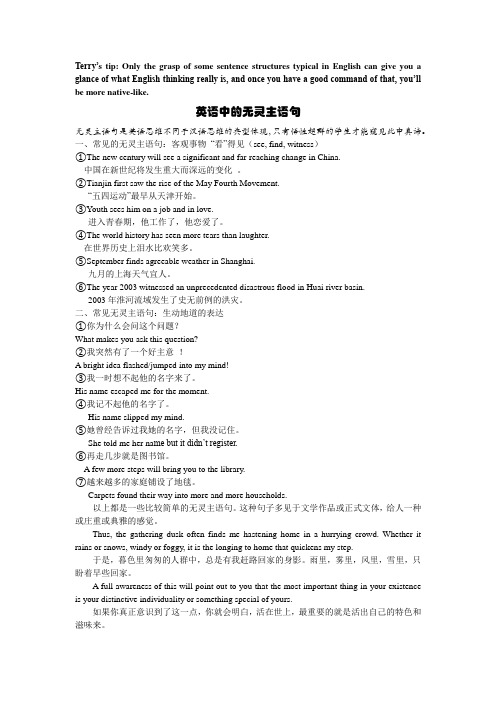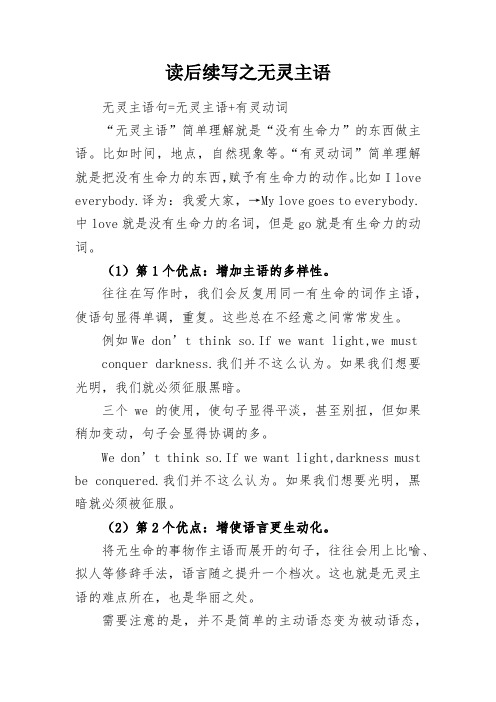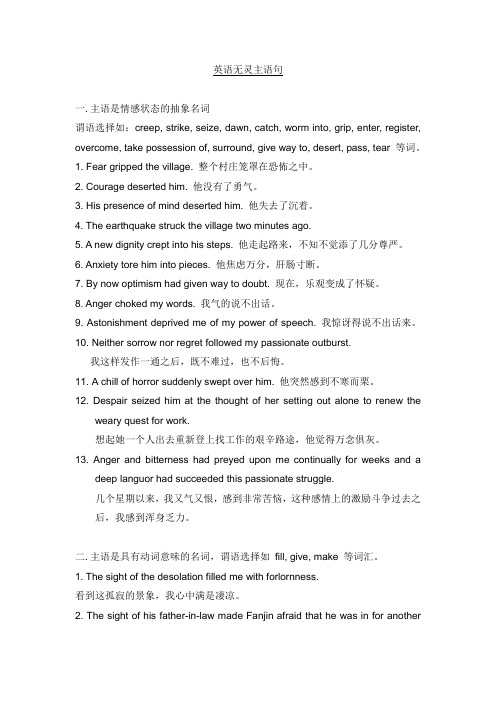无灵主语句
私家英语无灵主语句专练学案

无灵主语练习-私家英语无灵主语句=无灵主语+有灵动词( 用主动语态表达被动意义)无灵主语:用无生命的事物做主语; 有灵动词:有生命的事物的动作和行为.我忘了他的名字了。
His name _______\________\_____________\__________________.一:无灵主语是表示时间和地点的名词,谓语动词常用“witness”、“see”、“find”。
1.上周日,我们进行了一次非同寻常的远足,让我们每个人都兴奋不已。
2.我们学校的音乐厅将举办春节联欢晚会(gala)以庆祝春节的到来.3.上周举办了“探索英语原创小说”活动,旨在引导学生进入英语文学的神奇旅程。
4.接下来的几天,我们目睹了这群人清除杂草,从空地上挖出大块的石头,并把它们拿走。
5.接下来的15分钟见证了我们精彩的表演,每个人都沉浸在表演中,我完全忘记了我的紧张。
6.这难忘的经历见证了我的成长,我知道,经过艰苦的努力和坚持,我的前途是光明的。
7.暮色渐浓,我常常在匆匆忙忙的人群中匆匆回家。
二:具有行为和动作意义的名词sight, thought, glance, look, idea, ...做无灵主语, 1.我突然有了一个好主意。
2.看到这么多老师,我心中满是紧张。
3.一看到闹钟,我就知道我迟到了。
4.想到他这次考试不及格,他就有了奋斗的力量。
三:使用抽象名词,自然现象,身体部位名词作无灵主语1.雨使得游客无法欣赏到满月。
2.笑声在房间里萦绕。
3.低云裹住山腰4.夜幕降临,黑暗笼罩着森林。
5.当她看到熟悉的字迹时,便热泪盈眶。
6.她一个人的时候,她总感觉有一种奇怪的平静. come over(感情)掌握住某人7.微风轻柔地亲吻着她的脸庞8.我会永远记住这次经历\教训。
9.深深的皱眉渐渐爬上我的脸.10.当我最终在所有观众面前展示自己时,语言无法表达我的兴奋和欣喜四:情感类名词或心理活动名词作无灵主语1.想到考试的失败,我很失望。
体现英语思维的句型——无灵主语句

Terry’s tip: Only the grasp of some sentence structures typical in English can give you a glance of what English thinking really is, and once you have a good command of that, you’ll be more native-like.英语中的无灵主语句无灵主语句是英语思维不同于汉语思维的典型体现,只有悟性超群的学生才能窥见此中真谛。
一、常见的无灵主语句:客观事物“看”得见(see, find, witness)①The new century will see a significant and far-reaching change in China.中国在新世纪将发生重大而深远的变化。
②Tianjin first saw the rise of the May Fourth Movement.“五四运动”最早从天津开始。
③Youth sees him on a job and in love.进入青春期,他工作了,他恋爱了。
④The world history has seen more tears than laughter.在世界历史上泪水比欢笑多。
⑤September finds agreeable weather in Shanghai.九月的上海天气宜人。
⑥The year 2003 witnessed an unprecedented disastrous flood in Huai river basin.2003年淮河流域发生了史无前例的洪灾。
二、常见无灵主语句:生动地道的表达①你为什么会问这个问题?What makes you ask this question?②我突然有了一个好主意!A bright idea flashed/jumped into my mind!③我一时想不起他的名字来了。
无灵主语句[整理版]
![无灵主语句[整理版]](https://img.taocdn.com/s3/m/4771b952f08583d049649b6648d7c1c708a10bd8.png)
英语无灵主语句一.主语是情感状态的抽象名词谓语选择如:creep, strike, seize, dawn, catch, worm into, grip, enter, register, overcome, take possession of, surround, give way to, desert, pass, tear 等词。
1. Fear gripped the village. 整个村庄笼罩在恐怖之中。
2. Courage deserted him. 他没有了勇气。
3. His presence of mind deserted him. 他失去了沉着。
4. The earthquake struck the village two minutes ago.5. A new dignity crept into his steps. 他走起路来,不知不觉添了几分尊严。
6. Anxiety tore him into pieces. 他焦虑万分,肝肠寸断。
7. By now optimism had given way to doubt. 现在,乐观变成了怀疑。
8. Anger choked my words. 我气的说不出话。
9. Astonishment deprived me of my power of speech. 我惊讶得说不出话来。
10. Neither sorrow nor regret followed my passionate outburst.我这样发作一通之后,既不难过,也不后悔。
11. A chill of horror suddenly swept over him. 他突然感到不寒而栗。
12. Despair seized him at the thought of her setting out alone to renew theweary quest for work.想起她一个人出去重新登上找工作的艰辛路途,他觉得万念俱灰。
无灵主语句

第二类公式:主语(身体部位/音容笑)+有灵动词+sb
(一)常见此类名词 face/eye/heart/fingers/tears/smile/voice/throat (二)常见有灵动词 fill 充满 stream流淌 interrupt打断linger 继续留存 (tears)spring up =well up 后买你不能直接加人或物 +in one’s eyes (tears) flood/sweep/wash over+sb Tears blurred one’s eyes./one’s eyes got misty ./One’s eyes mistied /dimmed with tears泪眼模糊 tears (roll down one’s eyes/cheeks/face)泪水落下 spread across 浮现 pale 苍白 pierce刺痛 (eyes)brim: v.(使)满,盛满 with tears (eyes) twinkle /sparkle(眼睛因高兴而)发亮;发光;闪耀 (face/eyes) brighten/light up /glow “面露喜色,露出饶有兴趣或喜出望外的神情” “因...颤抖“tremble /shiver/shake (with fear,panic,excitement,rage...)
3. Rome witnessed many great historic events. 罗马发生过许多重大历史事件。
4. The stadium has seen many exciting football matches. 在这体育场里举办过很多精彩的足球赛。
5. The town boasts a beautiful lake. 这个镇引以为荣的是有个美丽的湖。
汉语无灵主语句的理解及其英译

汉语无灵主语句的理解及其英译
汉语无灵主语句是指没有主干动词做主语的句子,没有明确表示出句子主语时,句子主干和句子其他成分有某种关系才能让句子表达意思,故被称为无灵主语句。
无灵主语句可以分为两类:实语无灵主语句和状语无灵主语句。
实语无灵主语句是指在句子中没有主语出现,但宾语是句子的主干,可以将句子的表达意思联系起来的句子。
例如“冬天,穿棉袄”。
在此句中,穿棉袄是句子的主体,宾语,也是动词穿的宾语,因此可以把“穿棉袄”作为句子的主干,用来表达句子的主语,这样就可以把这句话称为实语无灵主语句。
状语无灵主语句是指在句子中没有主语出现,但是状语是句子的主干,可以将句子的表达意思联系起来的句子。
例如“晴天,一起去游泳”,这句话中,晴天是句子的状语,可以将句子的表达意思联系起来,这样就可以把这句话称为状语无灵主语句。
English Translation:
Chinese non-subjective sentences, are sentences without a main verb subject, when there is no clear indication of the subject in the sentence, the main clause and other components must form a certain relationship in order for the sentence to make sense, and thus, it is known as a non-subjective sentence.。
28.3.1--无灵主语的特点

28.3.1--无灵主语的特点
1) 英语无灵主语句表达生动有力
例: The year 1998 witnessed an unprecedented disastrous flood in Changjiang River basin.1998年长江流域发生了史无前例的洪灾。
2)英语无灵主语句客观公正
例: Informed guesswork suggests that major tax changes are being considered by the Treasury Department.消息灵通人士猜测,财政部正考虑对税收作重大改革。
3)英语无灵主语句表达紧凑、简洁、凝练
例: High efficiency without anger makes her an angel.她办事效率高,又不发火,简直是个天使。
4)无灵主语句显得更加庄重、含蓄、幽默,多使用在正规文体例: The world history has seen more tears than laughter. 在世界历史上,泪水比欢笑多。
5)无灵主语句往往有拟人化的修辞色彩
例: A strange peace came over her when she was alone. 她独处便感到一种特殊的安宁。
总之无灵主语句是地道的英美人在正式文体中经常使用的表达方式。
这并不意味着不分场合不分语境走极端。
应该充分了解无灵主语句的产生及特点和翻译策略,从而更地道的使用英语。
无灵主语句练习

无灵主语句练习1 / 1 .无灵主语句1.到了秋天,北京很多年青人穿上了精心裁制的衣服。
Autumn sees many youngBeijing people in smartly tailored clothes.2.镇上有个漂亮的湖,人人以此骄傲。
The town boasts a beautiful lake.3.从他的办公室窗口能够看到城镇的全景。
A glance in his office window offersa panoramic view of the town.4.我们步行十分钟就到了旅店。
A ten minute ’s walk brought us to the hotel.5.我完整丧失了勇气。
All my courage deserted me.6. 看到我们的飞机,听到飞机隆隆的声音,令我特别向往。
The sigh and sound ofour jet filled me with special longing.7.因下雨,我不可以来。
The rain prevented me from coming.8.这个城市刚下过一场大雨。
A heavy rain just visited the city.9.走在厚厚的地毯上,一点脚步声都没有。
The thick carpet killed the sound offootsteps.10.世界上已有不一样的现代化道路。
The world has witnessed different roads tomodernization..。
写作微技能——无灵主语的使用

无灵主语的使用
Introduction
无灵主语句: inanimate subject(无灵主语)+animate verb(有灵动词)
无灵主语inanimate subject 物品、动作、情感、时间、地点等
有灵动词animate verb 有生命的事物的动作和行为,如:see、find、bring、
Function:
一、增加主语多样性, 丰富句型
Life has taught me that success is not final. So I always stay humble and never let it go to my head.
二、使语言更生动, 表达丰富,句子瞬间 充满生命力
四、文学作品中给人一 种庄重、典雅的感觉
Thus, the gathering dusk often finds me hastening home in a hurrying crowd. Whether it rains or snows, windy or foggy, it is the longing to home that quickens my step.
give、escape、witness、seize、deny...
汉语常用句子结e subject(有灵主语)+animate verb(有灵动词) I love all my students. (有灵主语 I )
inanimate subject(无灵主语)+animate verb(有灵动词) My love goes to all my students.(无灵主语 love)
The past four years has witnessed an increase in production. ④ At dusk, he was crying in the street. Dusk found him crying in the street. ⑤近十年来,青少年使用社交网站的人数呈爆炸式增长。 The recent decade has witnessed an explosive growth in the number of teenage
无灵主语句

无灵主语句英语无灵主语句一.主语是情感状态的抽象名词谓语选择如:creep, strike, seize, dawn, catch, worm into, grip, enter, register, overcome, take possession of, surround, give way to, desert, pass, tear 等词。
1. Fear gripped the village. 整个村庄笼罩在恐怖之中。
2. Courage deserted him. 他没有了勇气。
3. His presence of mind deserted him. 他失去了沉着。
4. The earthquake struck the village two minutes ago.5. A new dignity crept into his steps. 他走起路来,不知不觉添了几分尊严。
6. Anxiety tore him into pieces. 他焦虑万分,肝肠寸断。
7. By now optimism had given way to doubt. 现在,乐观变成了怀疑。
8. Anger choked my words. 我气的说不出话。
9. Astonishment deprived me of my power of speech. 我惊讶得说不出话来。
10. Neither sorrow nor regret followed my passionate outburst.我这样发作一通之后,既不难过,也不后悔。
11. A chill of horror suddenly swept over him. 他突然感到不寒而栗。
12. Despair seized him at the thought of her setting out alone to renew theweary quest for work.想起她一个人出去重新登上找工作的艰辛路途,他觉得万念俱灰。
高中英语-无灵主语

什么是无灵主语句无灵主语句,是指用无生命的事物做主语,用人或社会团体的行为或动作做谓语,因此这类句子常带有拟人化的修辞色彩。
该句的主语Rome罗马,是无生命的事物,但谓语witness目击,是人的动作。
这种“无灵主语+有灵谓语”的句式,就是无灵主语句。
无灵主语句的亮点在哪?举例对比一下:普通句:She had a good idea.无灵主语句:A good idea came across her mind. / A good idea struck her./ A good idea occurred to her.同样是表达“她有了个好主意”,比起普通句式中的常见句子,无灵主语句中这种拟人化表达,明显更生动、更高级!无灵主语句的分类在读后续写中,无灵主语句的使用主要是有5类。
1. 情感状态的抽象名词+谓语在读后续写中写到人物的情绪或心理时,不要总用sb. feel...,尝试一下无灵主语句。
例如:Fear gripped the village. 整个村庄笼罩在恐怖之中。
Courage deserted him. 他失去了勇气。
Anger choked my words. 我气得说不出话。
A wave of nervousness washed over him. 一阵紧张的情绪涌上他的心头。
A chill of horror suddenly swept over him. 他突然感到不寒而栗。
Excitement seized him. 他好兴奋。
这种拟人化的描写,将情绪生动地表达出来,在考试中绝对加分!补充一些相关常见词汇,大家续写时,可以根据文中的情绪,挑选恰当的词自行搭配。
常见的情绪名词:happiness, joy, delight 开心快乐surprise, astonishment 惊奇,惊讶shame 羞耻,羞愧anger 愤怒despair 绝望regret 遗憾,后悔sorrow 悲伤horror 惊恐anxiety 焦虑disappointment 失望,沮丧satisfaction 满意,满足puzzlement 困惑不解常见的谓语动词:seize 侵袭choke 噎住,堵住flood 充满creep 不知不觉产生grip 紧抓give way to 被……代替wash over 洗涤,侵袭deserted 丢弃,遗弃2. 思考/动作行为的名词+谓语在读后续写中描写人物动作或思考行为时,也可以使用无灵主语句。
高中英语无灵主语讲义及练习

无灵主语什么是无灵主语句呢?即没有生命的事物来做主语的句子,因此这类句子常常带有拟人化的修辞色彩。
比如,”北京见证了数不清的历史事件。
”无灵主语句在读后续写中非常地常见,正确而又恰当地使用它,可以让句子的描写更加生动。
运用“无灵”主语句,能突出人物的心理情感,使续写语言更加生动形象、栩栩如生➢下面我将从五个方面阐明它的运用。
■句式1在读后续写中写到人物的情绪或心理时,不要总用sb feel...,尝试一下无灵主语句,可以让阅卷老师读起来更有画面感。
(a burst/wave/surge/rush/ripple/sense/feeling of+)表情感状态的名词十有灵动词十sb.表“某人感到…”或“一阵/一种……向某入袭来”常见的情感名词有:开心:happiness/joy/delight 愤怒:anger/rage/fury/irritation 悲伤:sadness/ sorrow/grief 感激:appreciation/gratitude 钦佩/赞赏:admiration/appreciation 悔恨/愧疚:remorse/guilt/shame 害怕:fear/terror/fright/horror/panic 震惊: astonishment/shock/amazement/surprise 满足:satisfaction 困惑:puzzlement/confusion用于该句式的有灵动词(短语)有:seize/take hold of “抓住;攫住”;get the better of/defeat“击垮”;sweep/flood/rush over“袭来”;creep upon “慢慢产生” ;come over “影响” ; run through/pass through “掠过” ;swallow“吞噬;淹没”;choke “使哽咽” ;tear...into pieces “把……撕碎” ;fail“使失望;有负于”等。
高中读后续写情绪描写——无灵主语句

Maruko’s mother felt that a wave of anger swept over her. 小丸子的妈妈感到一阵愤怒。
“无灵”主语句
She was so sad that she burst into crying. She was standing by the door, crying sadly. Suffering and despair defeated her, and she fell sobbing by the door.
>>>Practice makes perfect!
4. 她焦虑不安,在比赛前突然失去了信心。 ______A_n_x_i_e_ty______(主语) tore her into pieces, and before the competition her ____c_o_n_f_i_d_e_n_c_e____(主语) suddenly _________e_s_c_a_p_e_d_/f_a_il_e_d_______(动词) her. 5. 意识到小男孩说了谎时, 她的脸上掠过失望的神情。 When she realized the little boy had lied, ___a_l_o_o_k_o_f_d__is_a_p_p_o_i_n_t_m_e_n_t__(主语) _____c_r_o_s_se_d_/_f_la_s_h_e_d___(动词) her face.
>>>Practice makes perfect! II. 根据 I 中各句进行一对一仿效写句,并背诵。
1. 当老人多年后回到家乡时,激动得热泪盈眶。 When the old man returned to his hometown after so many years, tears of excitement welled up in his eyes. 2. 接着到她表演了,她的心都快跳到嗓子眼儿了。 Then came she to perform, and her heart flew up her mouth. 3. 看着那头发怒的北极熊,我们吓得心脏狂跳,两腿发软。 At the sight of the angry polar bear, we felt so scared that our hearts were pounding and our knees felt weak.
新高考 读后续写之无“灵”主语+有“灵”谓语

那个寒冷的下午,他在雪地里稿跋定涉PPT。
7.Night has fallen over the coun稿tr定y.PPT,海量素材持续更
新,上千款模板选择总有一
夜幕已经笼罩着乡间。
款适合你
运用技巧
一 时间/地点/场景类名词+谓语
8. Last Friday saw a cross-country running race taking place with its route from
笑声在房间里萦绕
5. Tears welled up in Lily’s's eyes.
泪水从Lily的眼中涌出
稿定PPT
6.His face burned with ห้องสมุดไป่ตู้mbarras稿s定mPePnT,t.海量素材持续更
新,上千款模板选择总有一
他尴尬的脸都红了。
款适合你
运用技巧
五 行为动作的名词作主语+谓语
只工作,不玩耍,聪明小伙也变傻。
04
运用技巧
运用技巧
一 时间/地点/场景类名词+谓语
无灵主语:silence,hush安静沉默;dusk 黄昏;dawn 黎明破晓;morning;
afternoon;night等。
有灵动词:see 看见;witness 见证;find 发现;fall 降临进入等。
4. Despair seized him at the thought of his failure in the exam.
一想到考试的失败,他就万念稿俱定灰PPT。
5.A wave of nervousness washe稿d定oPvPTe,r海h量im素.材持续更
体现英语思维的句型——无灵主语句

体现英语思维的句型——无灵主语句Terry’s tip: Only the grasp of some sentence structures typical in English can give you a glance of what English thinking really is, and once you have a good command of that, you’ll be more native-like.英语中的无灵主语句无灵主语句是英语思维不同于汉语思维的典型体现,只有悟性超群的学生才能窥见此中真谛。
一、常见的无灵主语句:客观事物“看”得见(see, find, witness)①The new century will see a significant and far-reaching change in China.中国在新世纪将发生重大而深远的变化。
②Tianjin first saw the rise of the May Fourth Movement.“五四运动”最早从天津开始。
③Youth sees him on a job and in love.进入青春期,他工作了,他恋爱了。
④The world history has seen more tears than laughter.在世界历史上泪水比欢笑多。
⑤September finds agreeable weather in Shanghai.九月的上海天气宜人。
⑥The year 2003 witnessed an unpreceden ted disastrous flood in Huai river basin.2003年淮河流域发生了史无前例的洪灾。
二、常见无灵主语句:生动地道的表达①你为什么会问这个问题?What makes you ask this question?②我突然有了一个好主意!A bright idea flashed/jumped into my mind!③我一时想不起他的名字来了。
高考写作无灵主句知识讲义-高三英语二轮复习

高考英语写作无灵主句一、定义无灵主语就是用无生命的事物作主语。
【例句】1.Shock deprived me of my power of speech.我惊讶得说不出话来2.Horror rulled the whole room.恐惧笼罩了整个房间。
3.The past three years witnessed our growth.过去的三年见证了我们的成长综上例句所述,无灵主句=无灵主语+有灵动词(+宾语)这类动词常用的为:看见see 发现find带来bring见证witness 给予give逃离escape 包围surround剥夺deprive提供serve发送赠送send告诉/见证tell允许permit邀请invite拿/带take驱使drive阻止prevent 等二、分类无灵主语共有四类第一类表示的情感/状态名词作主语例句:1.我紧张得说不出话来。
Tension choked my words.2.我心中充满了喜悦。
A thrill of joy flooded me.3.她失去了勇气。
Courage deserted her .【练习】他惊慌失措。
【答案】Panic seized him表情感/状态的常见名词汇总:开心 delight 激动 thrill放松 relaxation 满意 satisfaction震惊 shock 悲伤sorrow绝望desperation沮丧 frustration愤怒 rage焦虑 anxiety疲惫exhaustion恐惧 fear/horror困惑 confusion羞愧shame尴尬embarrassment孤独loneliness第二类表示思考/动作行为的名词作主语例句:我脑子里闪过一个可怕的念头An awful thought struck me.我们爬了50分钟到了山顶。
A 50 minutes' climbing brought us to the top of the mountain. 【练习】看到这个情景使我心中充满了幸福。
人教新课标-高三英语一轮复习---无灵主语句-让写作地道且灵动-课件

英语常用句子结构:
inanimate subject(无灵主语)+animate verb(有灵动词) My love goes to all my students.(无灵主语 love)
eg: 我想不起他的名字了。
I forgot his name.
无灵句表达:
His name escaped me . His name failed me. His name slipped my mind. His name didn't take root in my mind.
学段学科:高中英语 年级学期:高二第一学期 课名:《无灵主语句,让写作地道且灵动》
Introduction
无灵主语句: inanimate subject(无灵主语)+animate verb(有灵动词)
无灵主语inanimate subject 没有生命的事物充当句子的主语成分, 如物品、
动作、情感、时间、地点等
5.最近几年,我们学校大力发展了体育。(邮件)
_R__e_ce__n_t _y_e_a_rs__h_a_v_e_w__it_n_e_s_s_e_d____ great development of our school's
physical education.
Category 2: 情感类名词作主语
常见表达: The sight of...看到... The thought of...想到...
我们步行十分钟就到了目的地。
eg: 一看到闹钟,我就知道我迟到了。 The sight of the clock reminded me that I was late.
1.看到这个情景,我心中满是恐惧。
教学总结-读后续写之无灵主语

读后续写之无灵主语无灵主语句=无灵主语+有灵动词“无灵主语”简单理解就是“没有生命力”的东西做主语。
比如时间,地点,自然现象等。
“有灵动词”简单理解就是把没有生命力的东西,赋予有生命力的动作。
比如I love everybody.译为:我爱大家,→My love goes to everybody.中love就是没有生命力的名词,但是go就是有生命力的动词。
(1)第1个优点:增加主语的多样性。
往往在写作时,我们会反复用同一有生命的词作主语,使语句显得单调,重复。
这些总在不经意之间常常发生。
例如We don’t think so.If we want light,we mustconquer darkness.我们并不这么认为。
如果我们想要光明,我们就必须征服黑暗。
三个we的使用,使句子显得平淡,甚至别扭,但如果稍加变动,句子会显得协调的多。
We don’t think so.If we want light,darkness must be conquered.我们并不这么认为。
如果我们想要光明,黑暗就必须被征服。
(2)第2个优点:增使语言更生动化。
将无生命的事物作主语而展开的句子,往往会用上比喻、拟人等修辞手法,语言随之提升一个档次。
这也就是无灵主语的难点所在,也是华丽之处。
需要注意的是,并不是简单的主动语态变为被动语态,而是用主动语态去表达被动意义。
比如:I forgot his name.我们忘了他的名字了。
并不是简单地变为His name was forgotten by me.而应当更为形象的用主动语态表示。
比如我们可以说:“他的名字溜出了我的大脑。
”His name slipped my mind.“他的名字没有在我头脑中扎根。
”His name didn't take root in my mind.其实要写这样的句子并不难,只要掌握这种思想,加上一段时间的练习,肯定会下笔如有神。
无灵主语句

英语无灵主语句一.主语是情感状态的抽象名词谓语选择如:creep, strike, seize, dawn, catch, worm into, grip, enter, register, overcome, take possession of, surround, give way to, desert, pass, tear 等词。
1. Fear gripped the village. 整个村庄笼罩在恐怖之中。
2. Courage deserted him. 他没有了勇气。
3. His presence of mind deserted him. 他失去了沉着。
4. The earthquake struck the village two minutes ago.5. A new dignity crept into his steps. 他走起路来,不知不觉添了几分尊严。
6. Anxiety tore him into pieces. 他焦虑万分,肝肠寸断。
7. By now optimism had given way to doubt. 现在,乐观变成了怀疑。
8. Anger choked my words. 我气的说不出话。
9. Astonishment deprived me of my power of speech. 我惊讶得说不出话来。
10. Neither sorrow nor regret followed my passionate outburst.我这样发作一通之后,既不难过,也不后悔。
11. A chill of horror suddenly swept over him. 他突然感到不寒而栗。
12. Despair seized him at the thought of her setting out alone to renew theweary quest for work.想起她一个人出去重新登上找工作的艰辛路途,他觉得万念俱灰。
- 1、下载文档前请自行甄别文档内容的完整性,平台不提供额外的编辑、内容补充、找答案等附加服务。
- 2、"仅部分预览"的文档,不可在线预览部分如存在完整性等问题,可反馈申请退款(可完整预览的文档不适用该条件!)。
- 3、如文档侵犯您的权益,请联系客服反馈,我们会尽快为您处理(人工客服工作时间:9:00-18:30)。
英语里主语常用人称和非人称两种形式来表达。
用非人称主语表达时,往往注重“什么事发生在什么人身上”。
而汉语则较常用人称主语表达,侧重“什么人怎么样了”。
如1. A terrible thought suddenly struck me—had I locked the door?我突然产生了一个可怕的想法——我锁门了吗?例2.A strange peace came over her when she was alone.她独处时感到一种特别的安宁。
英语中非人称作主语的句子主要有两种类型:a非人称主语句采用“无灵主语”(inanimate subject),表示抽象概念、心理感觉、事物名称或时间地点等,但谓语却常常使用“有灵动词”(animate verb)表示人或社会团体的动作和行为,如:see,desert,find,bring,witness,give,escape,surround,kill,deprive,serve,send,know,tell,permit,invite,take,drive,prevent…from等,这类句子往往带有拟人化(personification)的修辞色彩(如上面两个例句)。
b用非人称代词“it”作主语例如:It never occurred to me that she was so dishonest.译文:我从没有想到她会这样的不诚实。
英语中的这类句子具备着含蓄幽默、生动活泼、客观公正、简洁凝练、句型多样等特点,所以使用广泛。
但是由于汉、英两种语言属于不同的语系,所以在翻译这种无灵主语句时,要考虑到英语的思维方法,然后转换为汉语的思维方法,把句子的内在意义用汉语表达出来。
下面就将非人称(impersonal)主语句英译汉的基本方法略作探讨。
1. 如果主语暗含着条件、因果、时间、地点、方式等意义时,用人作主语,把原来的主语翻译成各种形式的状语。
例如:The forty years, 1840-1880, brought almost ten million migrants to America.译文:从1840至1880这四十年中,近一千万移民移居美国。
2. 当谓语动词是情感型使动词时,如:surprise,disappoint,excite,disturb,inspire,puzzle,annoy,trouble,irritate,shock等;或得失型动词,如:lost,get,gain,take,fail,save,win,leave等,翻译时可保留主语,把谓语动词转译成“使……”结构。
例如1) The beautiful scenery gained the place quite a reputation.译文:美景使这个地方颇有名气。
2). Her habit of biting her nails irritates me.译文:她咬指甲的习惯使我生气。
3. 把原句中表示生命概念的词变成主语,引申谓语动词的词义,并采用逆行翻译法。
例如:1) When he had to speak ,his confidence suddenly deserted him.译文:当他不得不说话时,他突然失去了信心。
2) It seems that a very difficult decision now faces him.译文:他好象面临着困难的抉择。
4. 当有灵动词是某些感官动词,如:see,witness,speak,tell等时,保留无灵主语,引申动词词义。
比如,有时可把谓语动词引申为含有“显示”,“表明”,“产生”等意义的词。
例如:The blood-stained glove told of the bandit's crime.译文:血迹斑斑的手套就是匪徒的罪证。
5. 重新确定主语,引申动词词义。
例如:It is generally felt that his appointment was a grave mistake.译文:现在许多人觉得,当时对他的任命是个严重的错误。
6. 译成汉语的无主句。
例如:Rumors had already spread along the street.译文:大街小巷早就传遍了各种流言蜚语。
7. 由于汉语“无灵主语”与“有灵动词”搭配通常被用作一种修辞手段----拟人化,所以有些句子我们不妨也采用“拟人化”的汉语句型来表达。
例如:Don't talk to me about no opportunity any more, opportunity's knocking down every door in the country, trying to get in.译文:别说什么机会难逢,机会正在国内挨家挨户敲门,想要进去呢。
此外,英语的“there be”句式及用不定代词“one”作主语的句子也具有非人称倾向,汉译时仍可采用上面提到的技巧。
例如:In 1955, there was a strike participated by six thousand workers.译文:1955年,六千名工人举行了一次罢工。
再看几个例子:1. I am very sorry that the pressure of other occupations has prevented me from sending an earlier reply to your letter.2. The smallest excuse would have served.3. Paying his son's debts left him almost penniless.4. That night sleep eluded me.5. The old house has seen better days.6. Everything at the party spoke of careful planning.7. The year 1949 witness the founding of the People's Republic of China.8. The universe is not rich enough to buy the vote of an honest man.9. The light from the stars started on its journey long time ago.10.One must be a servant before one can be a master.有读者问起笔者所译“大江东去,浪淘尽千古风流人物”(Chinese history sees Yangtze run;with rolling waves thousands years and myriad heroes are gone)中前一句如何理解。
这一句型在英语中比汉语中常见,其特征是以无生命事物作为主语,语言学家Holliday把它称为“无灵主语句”。
例如“The world history has seen more tears than laughter”(在世界历史上泪水比欢笑多),“The new century will see a significant and far-reaching change in China”(中国在新世纪将发生重大而深远的变化),“The year 2003 witnessed a unprecedented disastrous flood in Huai river basin”(2003年淮河流域发生了史无前例的洪灾)和“September finds agreeable weather in Shanghai”(九月的上海天气宜人)都属于这种句型。
英语中使用这一句型一方面是为了表达生动、有力,另一方面也和西方的思维方式有关。
英美更重视客观性,因此表达倾向于更多地使用客观事物做主语。
例如,表达“他总是很机智”,我们也许会说“He is always quick-witted”,但“Quick-wit never deserts him”的说法更地道、有力。
表达“我突然有了一个好主意”中国学生倾向于说“Suddenly I have a good idea”,而英美的人会说“A good idea suddenly occurs to me”或“A good idea suddenly strikes /hits me”。
使用无灵主语句可以使句子更加紧凑简洁。
如“她做事效率高,又不会发火,简直是个天使”可以翻译成“High efficiency without anger makes her an angel”,把三句压缩成一句。
学术文章中这一句型可以使语句显得更加庄重、客观。
如“We carried out more experiments and found some exciting results”和“Further experiments gave us some exciting results”相比,后一句不仅简洁,而且像是出自研究人员之手。
不过,在口语中也有这一句型,如“His name slips my mind”(我忘了他的名字),“Words fail me!My favorite team lost.”(我无话可说。
我最喜欢的队输了)。
由于这一类句型涉及英汉语言和思维的差异,所以考试中多次出现。
如1998年6月四级考试第40题“The last half of the nineteenth century __the steady improvement in the means of travel”(正确答案为haswitnessed);1996年考研英语阅读理解Passage5的开头一句“Rumor has it that more than 20 books on creationism/evolution are in the publisher’spipelines”(据传有20多本关于神造论和进化论的书即将出版)难倒了众多考生。
1999年6月四级阅读PassageFour第38题中也出现了“the toy industry has witnessed great leaps in technology inrecent years”的选项。
类似句子在作文题中也大有用武之地driven 9. gripped 10. saw 11. failed 12. reached 13. saw 14. witnessed 15.caught 16 killed 17. kills 18..eluded/ escaped 19. went 20. forbids2.Bitterness fed on the man who had made the world laugh.这位曾给全世界带来笑声的人自己却饱尝辛酸。
